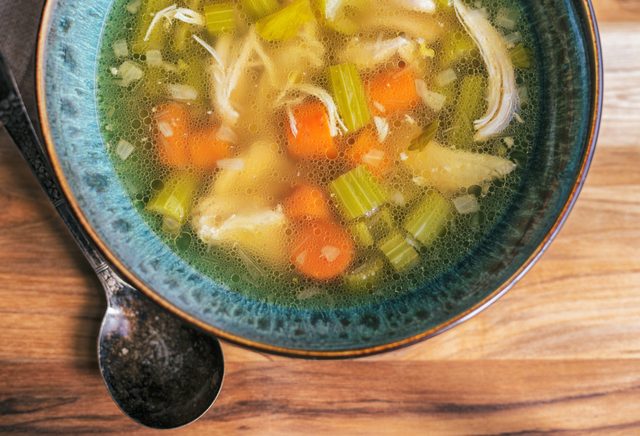Can Zinc Protect You From Coronavirus and Colds?
Updated: Oct. 11, 2022
Learn how taking the mineral zinc may help shorten the common cold and speed up your recovery time, according to science.
The common cold is a type of coronavirus—though much less serious than the novel coronavirus responsible for the pandemic and Covid-19 infections. Catching a cold can affect your entire body, and may even require taking a sick day at work.
The zinc-Covid-19 link
There’s been a tremendous amount of interest in taking supplements to try to protect against the coronavirus, says Ginger Hultin, RD, Seattle-based spokesperson for the Academy of Nutrition and Dietetics. While there’s no pill that can prevent or cure Covid-19, zinc might be helpful for supporting overall health and immunity, especially when you’re feeling stressed. A study in the journal Clinical Immunity notes that taking up to 50 milligrams of zinc per day may play a protective role in the Covid-19 pandemic by improving resistance against the viral infection. These benefits, however, may only be for those who are deficient in zinc.
Hultin is cautiously optimistic: “The common cold is a coronavirus, and research shows that zinc has an undeniable effect on immune response,” she says. “However, a cold is not Covid-19, and this data is very preliminary.”
Shortening the common cold
While a cure for the common cold doesn’t exist, you’ve probably heard zinc may help speed up recovery time. Some research agrees. A 2017 study published in the Journal of the Royal Society of Medicine Open, for example, found that taking zinc lozenges—specifically, 80 to 92 milligrams a day—at the first sneeze or sniffle can reduce the duration of the common cold by 33 percent.
A 2017 review published in Open Forum Infectious Diseases also provides similar evidence. Researchers found that taking zinc acetate lozenges may increase the rate of recovery from the common cold. By day five, 70 percent of people with colds who were taking zinc lozenges had recovered, compared with only 27 percent of those who didn’t take zinc.
Most colds are caused by a virus called rhinovirus, which thrives in the nasal passages and throat. Zinc may work by preventing the rhinovirus from multiplying. It also may keep the virus from lodging in the mucous membranes of the throat and nose. (Here are seven signs you’re not getting enough zinc.)
How to take zinc
Although research suggests zinc taken via lozenges and syrup can be beneficial in decreasing the duration of the common cold, zinc in multivitamins may not have the same effect, says Saba Hamiduzzaman, MD, a critical care physician at Loma Linda University Health in California. “The syrup and lozenge allow zinc to adhere to the upper airway passage which can decrease the severity and duration of the rhinovirus multiplying,” she says.
Researchers recommend taking zinc lozenges within 24 hours of the onset of symptoms. To be sure it’s a cold, look for “the presence of two or more of the following symptoms: nasal drainage, nasal congestion, cough, fever, muscle pain, headache, sore throat, scratchy throat, hoarseness, or sneezing,” says Waleed Javaid, MD, director of infection prevention and control at Mount Sinai Downtown in New York City.
Take zinc with caution
Although none of the studies observed serious adverse effects, “zinc toxicity can occur and interfere with the absorption of other metals,” says Dr. Javaid. However, “the toxicity can occur with a high level and chronic intake, so limited use may not have any substantial side effects.”
The U.S. Food and Drug Administration (FDA) does not recommend using intranasal zinc as it can cause permanent loss of smell. And watch how much you use. Chronic, continuous use of zinc supplementation can adversely affect the nervous system as well as cause anemia in some people, notes Dr. Hamiduzzaman.
Many zinc lozenges sold at drugstores are ineffective. Often the dose is too low or they contain ingredients—like citric acid—that interact with zinc in a way that keeps the mineral from being released. Considering the potential benefits and the low risk of adverse side effects, researchers suggest trying zinc lozenges and deciding for yourself if they help you recover from the common cold. Just check each package’s list of ingredients and the recommended dosage. Better yet, advises Dr. Javaid, “consult with your health care provider to make sure it’s OK to use.”
 Alternatives to zinc
Alternatives to zinc
Here are a few other ways to feel better when you have the sniffles (and here are 13 foods high in zinc to get more into your diet):
• Chicken soup. This comfort food seems to make everyone feel better when they’re sick. It’s believed to work by inhibiting the immune system cells that participate in the body’s inflammatory response. It also seems to help relieve congestion and cut down the amount of time viruses are in contact with the nose lining.
• Humidity. One reason colds are more common in winter is because the virus thrives in dry conditions. Dry air also dries out the mucous membranes, causing a stuffy nose and scratchy throat. A humidifier can help relieve the symptoms by preventing “the drying of nasal secretions, which in turn helps in breathing and sinus drainage,” says Dr. Javaid. “When your airway becomes dry, the secretions become thick which makes you uncomfortable.” But a humidifier can be a breeding ground for mold and fungi, so be sure to change the water daily, and clean the unit according to the manufacturer’s instructions.
• Saline nasal drops and sprays. While they won’t cure you, saline products can combat congestion without drugs. Plus, most are safe and nonirritating, even for babies and young children. Read on for seven reasons you may feel stuffy and congested.